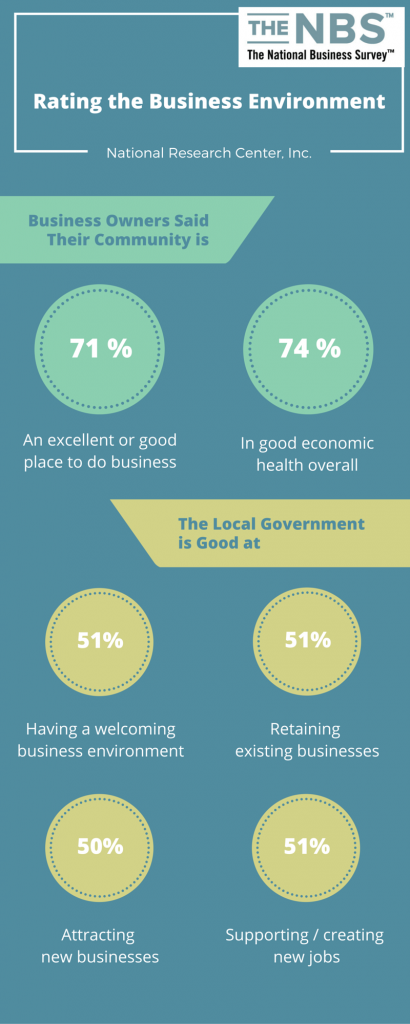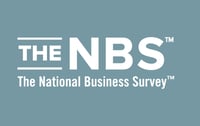Share this
An Insider’s Look at the State of Small Business in America
by NRC on February 5, 2018

- By Angelica Wedell -
It can be said that small businesses are the realization of the American Dream, and that their success drives the U.S. economy as a whole. Small businesses contribute resources to their communities, create jobs and give their Cities, Towns, Counties and Villages a touch of character. Yet for all the benefits they provide, there are many challenges that small businesses face in their efforts to keep their slice of the American Dream alive.
Research indicates that the economic health of the community entire is tied to the health of its business environment, and that small businesses especially need the support of their respective communities to thrive. Data from several different U.S. jurisdictions who have participated in The National Business SurveyTM by National Research Center, Inc. show that 71 percent of business owners in general view their city as a good place to do business and that 74 percent of business owners perceive their city to be economically healthy overall. These perceptions are a major consideration for where small business owners choose to locate themselves.
 These data come from The National Business SurveyTM
These data come from The National Business SurveyTM
While most business owners report the commercial environment positively, data also suggest local governments have work to do for improvement. Only half of business owners rated their communities “excellent or good” at nurturing a welcoming business environment, retaining/attracting businesses and supporting/creating new jobs.
It can be challenging for small businesses, organizations and foundations to find the right resources to help them succeed. So we spoke to expert Tim Gaudette, Colorado Outreach Manager for Small Business Majority, which actively engages small business owners across America to drive smart public policy and provide entrepreneurs with what they need to thrive.
Q: How do you help small businesses and entrepreneurs?
A: Small business owners are pragmatic, not ideological. And contrary to a long-held misconception, they are not reflexively anti-government. But, they want government to understand their needs and respond in a constructive manner. Therefore, we work with policymakers on a national and state level to advocate for policies that create jobs and maximize business opportunities and cost savings in tax reform, healthcare, clean energy, access to capital, infrastructure, workforce and more.
Q: Why are small businesses and entrepreneurs important to the community and downtown economy?
A: Small business is the backbone of the economy.
That phrase gets tossed around a lot. Too much, in fact. It’s a saying that should resonate with and be at the forefront of policymakers’ economic agendas, but has in many instances become little more than a feel-good bromide deployed while checking a political box.
The importance of small businesses is an economic reality and entrepreneurs deserve more than empty platitudes. Small businesses represent 99 percent of employer firms. They employ half of all private sector employees. They pay around 40 percent of U.S. private sector payroll. Small businesses and entrepreneurs have long been America’s engine for job growth and today more jobs are created by small businesses and the growing freelance workforce than any other way in America.
Small businesses aren’t simply the backbone of the American economy; they are its foundation. Indeed, entrepreneurship is essential to ensuring a truly inclusive economy that benefits all areas of the country, including ALL of our downtowns, large and small. As you may realize, a successful small business in an outlying or rural downtown can have a much larger impact that business might in a major city center. That is why ALL small businesses matter.
Q: Why is access to capital a challenge for many small businesses and entrepreneurs?
A: Access to capital has been a persistent problem for entrepreneurs, particularly since the recession. Small Business Majority’s opinion polling shows an overwhelming 90 percent of small business owners nationwide agree the availability of credit for small businesses is a problem, and 61 percent agree it’s harder to get a loan now than it was in 2008.
A report by the U.S. Small Business Administration’s (SBA) Office of Advocacy found that for the past two decades, economists have seen a 27 percent decrease in the availability of small loans, and as a result, small businesses are seeking out alternative forms of capital—which includes crowdfunding and other sources of online lending. The development of online lending holds the potential to get needed capital to entrepreneurs and to communities that have long been underserved, but it must proceed responsibly. This new breed of lending brings its own set of problems—unscrupulous actors who would take advantage of small business owners solely to pad their own pocketbooks. Not all online lenders are equal and some mask very high rates.
And while it has eased in some parts of the small business community, there are significant gaps that remain in critical areas, including in minority and rural communities and for women and veterans.
While women-owned firms are the fastest-growing segment of businesses, studies find that women do not get sufficient access to loans and venture investment. Women account for only 16 percent of conventional small business loans and 17 percent of SBA loans even though they represent 30 percent of all small companies.
Minority business development has also been on the rise—the rate of minority business ownership in 2012 was 14.6 percent, compared with 11.5 percent in 2007. However, according to the National Community Reinvestment Coalition, African-American businesses received 2.3 percent of Small Business Administration loans in 2013, down from 11 percent in 2008.
Small Business Majority recently launched a new access to capital resource portal to help entrepreneurs explore their options for securing capital and connect with financial experts, organizations and information to help them get the funding they need for their small businesses' start up, survival and growth.
Q: How can communities support the success of their small businesses?
A: Communities can help by driving demand for [small businesses’] goods and services, building a strong infrastructure and leveling the playing field. They can create a system that encourages prosperity for all by providing the resources for small businesses and entrepreneurs to be successful. These resources include greater access to responsible credit and capital, availability of clear information, opportunities and programs that enable them to compete and grow and access to a properly-supported skilled workforce.
 Colorado Outreach Manager for Small Business Majority, Tim Gaudette previously worked at a small business in Denver. His background includes significant finance and investment-related work in the regulatory, research and sales areas in Denver, Washington, D.C. and Baltimore. Tim also served as chairman and board member for the all-volunteer board of the Denver Gay & Lesbian Chamber of Commerce. Tim is a member of the Denver Metro Chamber of Commerce Foundation’s Leadership Denver class of 2009. Gaudette has degrees from the College of William and Mary in Virginia and the University of Exeter, United Kingdom. Image courtesy Tim Gaudette.
Colorado Outreach Manager for Small Business Majority, Tim Gaudette previously worked at a small business in Denver. His background includes significant finance and investment-related work in the regulatory, research and sales areas in Denver, Washington, D.C. and Baltimore. Tim also served as chairman and board member for the all-volunteer board of the Denver Gay & Lesbian Chamber of Commerce. Tim is a member of the Denver Metro Chamber of Commerce Foundation’s Leadership Denver class of 2009. Gaudette has degrees from the College of William and Mary in Virginia and the University of Exeter, United Kingdom. Image courtesy Tim Gaudette.
To learn more about Small Business Majority, you can visit their website www.smallbusinessmajority.org.
Related Articles:
Share this
Subscribe to Our Newsletter

Featured Report
Download your copy of "Make Informed Decisions with Confidence: Solving The Community Engagement Puzzle" today!
You May Also Like
These Related Stories

How To Streamline Data-Driven Strategic Planning With AI

Introducing AI Data Analytics for Government Performance Management and Decision-Making


